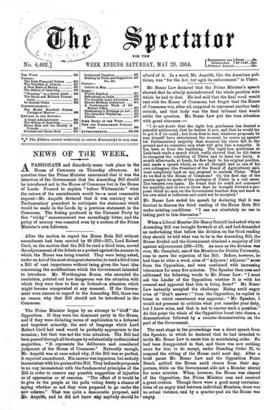The Prime Minister began by an attempt to " bluff
" the Opposition. If they were the dominant party in the House, and if they were dictating terms of capitulation to a defeated and impotent minority, the sort of language which Lord Robert Cecil had used would be perfectly appropriate to the occasion ; but that was not the true situation. The Bill had been passed through all its stages by substantially undiminished majorities. "It represents the deliberate and considered judgment of the House of Commons." Naturally enough, Mr. Asquith was at once asked why, if the Bill was so perfect, it required amendment. His answer was ingenious, bat entirely inconsistent with his praise of the Bill. They hadmade proposals in no way inconsistent with the fundamental principles of the Bill in order to remove any possible suggestion of injustice or of oppression or of coercion. "The effect of it would be to give to the people at the polls voting freely a chance of saying whether or not they were prepared to go under the new scbeme." That was quite a democratic proposal, said
.Asquith, and he did not know wily anybody should be
afraid of it. In a word, Mr. Asquith, like the American poli- tician, was "for the Act, but .gin its enforcement" in Ulster.














































